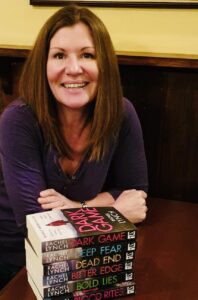7 tips to stay motivated and productive—from successful author Rachel Lynch.
Rachel trained to teach history becoming head of department in 4 years, married an Army Officer, whom she followed around the globe for thirteen years. Rachel had several changes of career after children, but writing was always the force driving the future. Rachel recently joined 4myschools in a spotlight session to share some useful tips on how to keep motivated and productive during lockdown.
To find out more about Rachel view her publishers page and to purchase her books click here follow Rachel on LinkedIn and Facebook

1. How do you motivate yourself to write when you’re stuck and could just fill your time with daily activities?
My motivation comes from playing it forward; that is, always knowing that chipping away at the big tasks is better than nothing. I don’t say “I’m going to finish twenty chapters today”, “I say, I’m going to open my computer and work”.
2. Is there a particular technique/skill that you have used in your career that you swear by and proved effective in each of your roles?
The ABC method. Every day, I reset and take stock of what I need to achieve and every day the list looks different.
A is what needs doing in the next couple of hours, so that might be an article for a magazine due today.
B is what needs doing in the next couple of days, this might be an edit.
C is what needs my attention in the coming weeks, and this might be a looming deadline.
A lot of As happen in real time, such as things the children need, so the priority list changes throughout the day too. I find this method keeps me focused and organised. The other thing I do is always leave a chapter halfway through, never at the end. That way, I don’t have to think of a new chapter focus the next day, I can carry on where I left off and get into the flow.
3. When are you most creative? Have you any tips on being more creative in the workplace?
I took this as meaning productive as well as creative. Again, it’s about being realistic and not allowing negativity to derail my plans. It’s easy to see the day as a tsunami of tasks that simply overwhelm and that’s when we are more likely to give up, I think. I use the ABC method to prioritise and say to myself often, enough is good enough. I also find that my work environment is important, so if that involves paying music, having a coffee at a certain time, having regular breaks to switch off, walking a lot, as well as not getting bogged down by the fact that every book I write is 100,000 words. I tackle it chunk by chunk. I think I’m better in the morning, so getting started is important. I get up with the children and start work as soon as I can, then, later in the day, I feel more accomplished.
4. Which of your jobs has been the most challenging and why?
Teaching for sure. The responsibility is great: being in the privileged position of influencing teenagers is something that needs to be respected and taken very seriously. Keeping 30 teenagers interested is the most challenging and rewarding thing I’ve ever done. I was the type of teacher who refused to teach unless people listened, so discipline was important, I hear from my own children that this is the single biggest thing affecting lessons, when the teacher can’t control the class and loses respect. I taught history so was fortunate to be able to tell stories and role play, but the imparting of knowledge must be relevant to each generation and that was the most important job to me.
5. What do you do to organise your day and ensure you stick to the schedule? What daily habits do you have to ensure success?
I first define to myself what success looks like because that could change daily. Some days, getting my daughter through a history essay is a success, other days, writing four chapters is a success. I accept that every day is not the same and I stick to the ABC method to keep me organised. I eat good food and get enough sleep because I need a lot of energy to juggle two teenagers, a house, and a full-time job. I ask for help when I need it. I have faith that if I chip away at a book, chapter by chapter, it will get finished, but it must be worked on daily, even if just a little.
6. How do you filter doomsayers’ views or other people’s influence (often well intentioned) that dilute your vision?
I don’t read reviews and I don’t write for the market. Everybody has a story and sometimes it’s fun to listen to what other people would put in their book if they had the chance. Many people are unaware of what it takes to complete a manuscript and I get a lot of well-intentioned ideas passed my way. I believe that if I wrote what people wanted to hear then it wouldn’t be authentic and so I write what comes from instinct and wait and see. Luckily, that has been a hit so far! My agent once said to me “put away your notes and use instinct over intellect” and it was the best advice he ever gave me. Details, little mistakes, and plot holes can be ironed out in the edit. When I’m creating, I’m in the zone and not thinking about what might sell or be popular.
7. How do you keep your mind active when not writing a book?
There’s always some stage of the process of publication going on. So, at any point, I could be in the middle of one novel, but I’ll be editing the last one, and planning the next. These processes use different parts of my brain, so I’m never bored. The creation process is different to research, which is different to editing, so it’s a multi-layered job.

